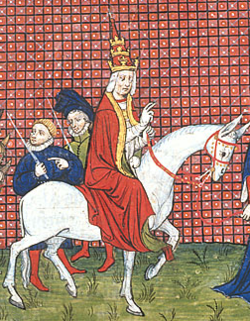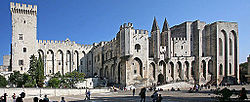1370 papal conclave
 From Wikipedia - Reading time: 9 min
From Wikipedia - Reading time: 9 min
A request that this article title be changed to 1370 conclave is under discussion. Please do not move this article until the discussion is closed. |
| Papal conclave December 1370 | |
|---|---|
| Dates and location | |
| 29–30 December 1370 Palais des Papes, Avignon | |
| Key officials | |
| Dean | Guy de Boulogne |
| Camerlengo | Arnaud Aubert |
| Protodeacon | Pierre Roger de Beaufort |
| Elected pope | |
| Pierre de Beaufort Name taken: Gregory XI | |
 | |
In the papal conclave held on 29 and 30 December 1370, after the death of Pope Urban V, Cardinal Pierre de Beaufort was elected pope under the name Gregory XI. He thus became seventh and the last pope of the period of Avignon Papacy.
List of participants
[edit]Urban V died on 20 December 1370, at Avignon. He was the first pope who resided in Rome since 1304, although only for a short time (1367 until the beginning of 1370, when he returned to Avignon). At the time of his death, there were 20 living cardinals. Eighteen of them participated in the conclave:[1]
| Elector | Title | Elevated | Elevator | Notes[2] |
|---|---|---|---|---|
| Guy de Boulogne | Bishop of Porto e Santa Rufina; commendatario of S. Cecilia and S. Crisogono | September 20, 1342 | Pope Clement VI | Dean of the Sacred College of Cardinals |
| Raymond de Canillac, C.R.S.A. | Bishop of Palestrina | December 17, 1350 | Pope Clement VI (Cardinal-nephew) | |
| Guillaume de la Sudrie, O.P. | Bishop of Ostia e Velletri | September 18, 1366 | Pope Urban V | |
| Gilles Aycelin de Montaigu | Bishop of Frascati | September 17, 1361 | Pope Innocent VI | |
| Philippe de Cabassole | Bishop of Sabina | September 22, 1368 | Pope Urban V | |
| Pierre de Monteruc | Priest of S. Anastasia | December 23, 1356 | Pope Innocent VI (Cardinal-nephew) | Archpriest of the Sacred College of Cardinals; Vice-Chancellor of the Holy Roman Church |
| Guillaume de la Jugié | Priest of S. Clemente | September 20, 1342 | Pope Clement VI (Cardinal-nephew) | Cardinal-protector of the Order of Franciscans |
| Jean de Blauzac | Priest of S. Marco | September 17, 1361 | Pope Innocent VI | |
| Guillaume d'Aigrefeuille, O.S.B. | Priest of S. Stefano al Monte Celio | May 12, 1367 | Pope Urban V | Camerlengo of the Sacred College of Cardinals |
| Stephen Langham | Priest of S. Sisto | September 22, 1368 | Pope Urban V | |
| Bernard du Bosquet | Priest of SS. XII Apostoli | September 22, 1368 | Pope Urban V | |
| Jean de Dormans | Priest of SS. IV Coronati | September 22, 1368 | Pope Urban V | Chancellor of the Kingdom of France |
| Etienne de Poissy | Priest of S. Eusebio | September 22, 1368 | Pope Urban V | Grand penitentiary |
| Francesco Tebaldeschi | Priest of S. Sabina | September 22, 1368 | Pope Urban V | |
| Pietro Corsini | Priest of S. Lorenzo in Damaso | June 7, 1370 | Pope Urban V | |
| Pierre Roger de Beaufort
(elected Pope Gregory XI) |
Deacon of S. Maria Nuova | May 28, 1348 | Pope Clement VI (Cardinal-nephew) | Protodeacon of the Sacred College of Cardinals; Archpriest of the patriarchal Lateran Basilica and of the patriarchal Liberian Basilica; Cardinal-protector of the Kingdom of Naples |
| Rinaldo Orsini | Deacon of S. Adriano | December 17, 1350 | Pope Clement VI | Archpriest of the patriarchal Vatican Basilica |
| Hugues de Saint-Martial | Deacon of S. Maria in Portico | September 17, 1361 | Pope Innocent VI |
Nine electors were created by Pope Urban V, five by Clement VI and four by Innocent VI.
Post of the Camerlengo of the Holy Roman Church, the most important during sede vacante, was occupied by Arnaud Aubert,[3] archbishop of Auch and nephew of Pope Innocent VI (but not a Cardinal).
Absentees
[edit]Two Cardinals, both created by Urban V, did not participate in this conclave, because they were in Italy:[1]
| Elector | Cardinalatial Title | Elevated | Elevator | Notes[2] |
|---|---|---|---|---|
| Angelic de Grimoard, C.R.S.A. | Bishop of Albano | September 18, 1366 | Pope Urban V (Cardinal-nephew) | Papal Vicar in Italy |
| Pierre d'Estaing, O.S.B. | Priest of S. Maria in Trastevere | June 7, 1370 | Pope Urban V (Cardinal-nephew) | Rector of the Duchy of Spoleto |
The election of Pope Gregory XI
[edit]
Eighteen cardinals present in Avignon entered the conclave on December 29. In the first ballot on the next day in the morning Cardinal Pierre Roger de Beaufort, nephew of Clement VI, protodeacon of the Sacred College, was unanimously elected Pope.[4] He initially opposed his election but eventually accepted and took the name of Gregory XI. On January 2, 1371, he was ordained to the priesthood, and on January 3 he was consecrated bishop of Rome by the dean of the College of Cardinals Guy de Boulogne, and crowned by the new protodeacon Rinaldo Orsini in the cathedral Notre Dame des Doms in Avignon.[5]
References
[edit]- ^ a b Miranda, Salvador. "Conclave of December 29 - 30, 1370 (Gregory XI)". The Cardinals of the Holy Roman Church. Florida International University. OCLC 53276621. Retrieved 2019-06-02.
- ^ a b Notes according to biographical entries of the respective cardinals on The Cardinals of the Holy Roman Church: consistories of the 14th Century by Salvador Miranda
- ^ Niccolò del Re, La Curia romana: lineamenti storico giuridici, Città del Vaticano, 1998, p. 296
- ^ G. Mollat The Popes at Avignon 1305-1378, London 1963, p. 59
- ^ Miranda, Salvador. "ROGER DE BEAUFORT, Pierre (1329/1331-1378)". The Cardinals of the Holy Roman Church. Florida International University. OCLC 53276621. Retrieved 2019-06-02.
Sources
[edit]- Salvador Miranda: list of participants of the papal conclave of 1370
- Pope Gregory XI
- G. Mollat, The Popes at Avignon 1305-1378, London 1963
 KSF
KSF